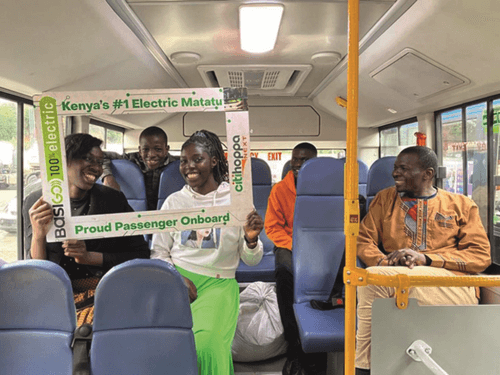
KENYA
BasiGo, which claims to be the first company to introduce electric buses into Kenya, has announced $6.6 million in new funding led by Mobility54, the corporate venture capital arm of Toyota Tsusho along with a number of other partners. The funding brings e-mobility start-up BasiGo’s total funding in 2022 to $10.9 million and will enable the company to begin commercial delivery of locally manufactured electric buses and charging infrastructure through its pay-as-you-drive financing model.
“BasiGo is thrilled to have the backing of investors who are leaders in the automotive sector and climate finance,” said CEO Jit Bhattacharya. “Over 90% of Kenya’s electricity already comes from renewables. Yet Kenya’s transport sector relies entirely on imported petroleum fuels. By electrifying Kenya’s public transport, we can make an immediate dent in climate emissions, clean up the air in our cities, and give bus owners relief from the rising cost of diesel. With this new funding, BasiGo is ready to bring the benefits of state-of-the-art electric transport to all people in Africa.”
Kenya’s public transport sector is home to over 100,000 privately-owned buses and minibuses, often referred to as matatus. BasiGo’s electric buses have already travelled over 110,000 kilometres and carried over 140,000 passengers as part of fleet operations with two Nairobi bus operators, Citi Hoppa and East Shuttle, and the firm says it has already received over 100 reservations from customers. It recently announced partnerships with KCB Bank and Family Bank to provide up to 90% financing to owners for purchase of an electric bus.
“We strongly believe in the potential of electric buses in Africa,” said CEO of Mobility54 Takeshi Watanabe. “BasiGo’s strong capability to implement the concept and its cutting-edge technology is the key to transforming conventional diesel buses to environmentally-friendly electric buses. We are extremely excited to build a solid partnership with BasiGo, and to support its growth by fully leveraging the business assets under Toyota Tsusho and CFAO.”
The greatest barrier to electric bus adoption in emerging markets is the high upfront cost, for which BasiGo’s offers a pay-as-you-drive model that allows owners to purchase an electric bus for a similar upfront cost to a diesel bus. Operators then pay a KES 20 (£0.14) per kilometre subscription fee, which includes leasing of the battery, charging at BasiGo charge stations, and comprehensive service and maintenance provided by BasiGo. With recent increases in fuel prices, Nairobi bus operators are currently paying an estimated KES 30-50 (£0.21-£0.34) per kilometre for diesel fuel alone.
BasiGo’s next 15 BYD K6 electric buses will be delivered in January and will enter operation with many of Nairobi’s largest bus operators. The firm is already deploying high-power, DC fast-charging stations at strategic locations across the city to support this expanded fleet, and reports that all buses delivered in 2023 will be locally assembled in Kenya. It aims to have over 1,000 electric buses deployed in the country by the end of 2025.
BasiGo’s 24-seat BYD K6 electric midibus is 7,010mm long, 2,160mm wide and offers a claimed range of up to 250km. East Africa is said to have some of the cleanest and most affordable electricity in the world, since Kenya produces over 70% of its electricity from renewable energy sources such as hydro, geothermal, solar, and wind. Replacing a diesel bus in East Africa with an electric bus would have greater impact than almost anywhere else in the world, BasiGo says, and an electric bus in the country would also cost owners less to operate.
The company was founded with a mission to revolutionise the public transport sector by providing bus owners with a cost-effective electric alternative to diesel. Headquartered in Nairobi, the company employs ‘seasoned entrepreneurs’ who have spent over a decade working and innovating within electric vehicle technology and mobility in Africa, and renewable energy financing.

